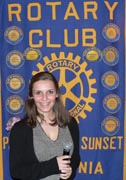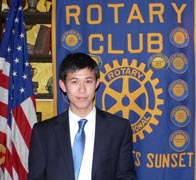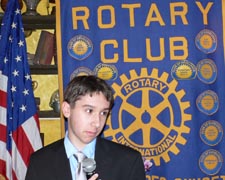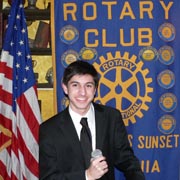Student Speech Contest
Audrey Dahlgren introduced the 4 speakers, the first 2 from Peninsula High School and the 2nd 2 from Palos Verdes High School. Each one spoke about a topic in relation to the Rotary 4-Way Test — “Is it the truth? Is it fair to all concerned? Will it build goodwill and better friendships? Will it be beneficial to all concerned?” The winner will participate at the District level.

Liliana Pond of Peninsula HS discussed her school experiences and her plan to major in nutrition, and then challenged us to think about what we ate in our last meal. One in 6 Americans and one in 4 children would not remember that because of hunger in the US. Poverty and high unemployment in recent years has aggravated this problem. Malnourished children tend to be more aggressive, anxious, and have more illnesses and worse school performance, and higher healthcare costs which we all pay for. They need more access to school breakfast programs. Lower income parents with low educational levels need to be taught how to make more affordable healthy meals at home. She passed out flyers on the issue of ending childhood hunger in America, including access, education and awareness. (See www.nokidhungry.org.)

Henry Zhang of Peninsula HS spoke on the effects and dangers of advancing technology. He called nuclear bomb technology the greatest risk we face in the world today, and called for steps the world community should take to avoid conflict. Past nuclear testing has caused radiation poisoning and deaths in test areas many years later (he gave an example in China). Terrorists are willing to use any means to achieve their objectives, and a nuclear warhead in their hands would be catastrophic. Even one bomb in a major city would cause many deaths and enormous economic dislocations for everyone. With nuclear proliferation, it is increasingly important to prevent these from falling into the wrong hands. We need to create a world not needing conflict to settle differences and misunderstandings.

Alexander Dean of PVHS discussed the differences between arguing and debating. Arguing is conflict, but debate relies on facts and logic to support one’s point. His parents had suggested his going to medical school, but he is more interested in becoming a lawyer, although he would face great competition out there. He discussed his interest in applying law to help others and improve justice to help build a better world.

Arman Madani of PVHS related his experiences participating in the Model UN program, where he learned how to relate to others with different cultures, religious traditions and nationalities (his parents came from Iran). He expressed concern for the decreasing political support for education on the national and state levels, and said the system needs to be changed. Education is only 2% of the Federal budget, much less than Defense and many other government programs, but it is a vital investment in the future strength and prosperity of our country. He discussed issues with standardized testing (teaching rote answers to questions rather than understanding concepts and how to think), and the budgetary loss of many school activities including Model UN. The result is that students are not learning much about the world, impairing their understanding of the future issues and problems that will confront our country.
After the speeches were completed, our Club’s judging committee met to choose a winner for District competition. The members agreed that all speakers were outstanding, and the decision was difficult, but Henry Zhang was declared the winner.